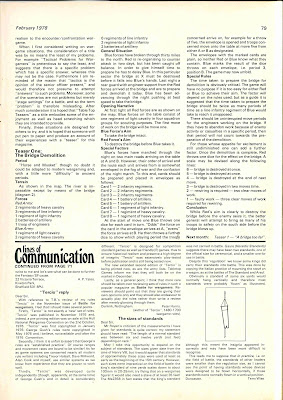The Situation
 |
| Ney: Courage, mes braves! They shall not pass! |
 |
| Ney (sotto voce), to the Engineers: Hurry up, for goodness sake! |
The Battle
Things did indeed get off to a roaring start for the Prussians with the appearance of two strong brigades of infantry and an artillery battery west of Der Dunklewald at the beginning of Turn 1.
 |
| The Baron von Driberg (for it is he): Ha ha hah! Ve haf zem cornered meine Kinder! |
But in a sign of things to come, the Prussian infantry immediately started to suffer heavy casualties as the Combined Voltgeurs swarmed out of the woods.
On Turn 3, however, the arrival of heavy Prussian reinforcements from the north threatened to turn the tide.
Meanwhile, the Prussian infantry continued to suffer appalling losses as they advanced.
This situation looked grim as Ney's reserves of infantry and artillery took up their positions north of the Weser.
In Turn 4, Driberg's final infantry brigade and cavalry arrived, but the Leib Hussars were immediately thrown into confusion as they passed the landwehr, who were still clogging up the approaches.
By this time both the Russo-Germans and the 1st Silesians had suffered horrific casualties. The French, on the other hand, had hardly lost a man.
Driberg decided that there was nothing for it but to commit the cavalry.
The 6th (Lützower) Ulans bravely charged the 8th Cuirassiers, but as the cuirassiers had had exactly the same idea things were not looking very good for the Prussians.
In the subsequent rout, a whole company of the Silesian Schutzen were ridden down by the pursuing cuirassiers.
In the meantime, the 1st Silesians had been virtually annihilated, and the Russo-Germans were about to go the same way. Prussian officer casualties were particulary severe.
But it was not all plain sailing for the French. Raked by cannister from the RGL artillery, the 8th Curiassiers were thrown into disorder. Nansouty was killed.
 |
| RGL: Kaboom! 8th: Aaaaarrgh! |
The Silesian Schutzen were also able to take out an entire French artillery battery with a single volley.
 |
| Driberg: Good Lord, I've hit somezing! |
Nevertheless, Driberg was fast running out of infantry. An attempt by the Leib Hussars to rush the Neuchâtel Battalion was also thwarted when the Canaries saw them coming and formed square.
 |
| Ney. Not so yellow after all! |
The overthrow of the Empress Dragoons (not one of my luckiest regiments) by the Garde du Corps did little to improve matters.
By the beginning of Turn 9, it was obvious that there was no way the Prussians would be able to reach the bridge in time to prevent its demolition.
 |
| His Dastardliness looks on in disbelief. |
Only a single C-class battalion (the Lützowers) retained good morale, and it would take at least two turns to get the Prussian guns into action, assuming they weren't mown down by the voltigeurs. With his cavalry also gravely depleted, Driberg decided it was time to throw in the towel.
 |
| Driberg (sensing imminent dismissal by the Prussians) : Hmmmm, I vonder if ze Kaiser might be looking for a new general? |
And so the battle ended in a manner not dissimilar to 1978, when Red's light infantry had played a similarly decisive role. It was also clear, however, that Mr Stryker's subtle tweaks to Muskets & Marshals have had some remarkable effects. It is simply suicidal, it seems, to attempt advances in column against unsupressed infantry and artillery fire. C-class infantry in particular haven't a ghost of chance. The congested approaches also made it virtually impossible for the Prussians to get their artillery into action.
 |
| The casualties: nearly all Prussians. |
Wellington Cat, however, was not particulary impressed.
Driberg promises to return with a horde or Austrians.
I'd better get painting some then.
WM
Edit 09/02/22: DF has sent me scans of the entire 1978 article, whch I post here for those who might be interested. He also included a scan of the back cover of the February issue as a special treat! I've no permissions to do this, so will take them down again if there are any objections.



















